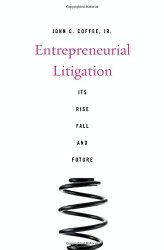$49.50
$49.50
(SAVE Now!)
as of 12/22/2024 (Details)
Uniquely in the United States, lawyers litigate large cases on behalf of many claimants who could not afford to sue individually. In these class actions, attorneys act typically as risk-taking entrepreneurs, effectively hiring the client rather than acting as the client’s agent. Lawyer-financed, lawyer-controlled, and lawyer-settled, such entrepreneurial litigation invites lawyers to sometimes act more in their own interest than in the interest of their clients. And because class litigation aggregates many claims, defendants object that its massive scale amounts to legalized extortion. Yet, without such devices as the class action and contingent fees, many meritorious claims would never be asserted.John Coffee examines the dilemmas surrounding entrepreneurial litigation in a variety of specific contexts, including derivative actions, securities class actions, merger litigation, and mass tort litigation. His concise history traces how practices developed since the early days of the Republic, exploded at the end of the twentieth century, and then waned as Supreme Court decisions and legislation sharply curtailed the reach of entrepreneurial litigation. In an evenhanded account, Coffee assesses both the strengths and weaknesses of entrepreneurial litigation and proposes a number of reforms to achieve a fairer balance. His goal is to save the class action, not discard it, and to make private enforcement of law more democratically accountable. Taking a global perspective, he also considers the feasibility of exporting a modified form of entrepreneurial litigation to other countries that are today seeking a mechanism for aggregate representation.
Technical Details
No features available.